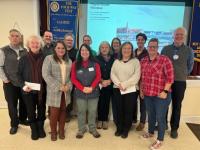Working with Mr. Rogers: ‘Thank you for letting me come’
Fred is in the news these days. Mister Fred Rogers that is. I knew Fred many years ago. When I tell people that, their eyes get wide, they ask “Really?” as if I were kidding.
Whenever I have been in a team building exercise and the activity is to share something others may not know about you, I reveal that I knew Fred Rogers. Fred was on the board of Children’s Hospital of Pittsburgh when I was the Director of the Child Life Department. Child Life was responsible for the hospital playrooms, the school program, daily life activities and helping children understand and cope with being sick and being in the hospital.
Our work overlapped in many ways as Child Life staff advocated for children, helped adults understand children and helped children understand the world around them, including why adults do what they do.
Fred and I served on the hospital Art Committee together, deciding what art was appropriate for the walls of a children’s hospital. Fred wrote the books Going to the Hospital and Going to the Doctor, both of which involved the Child Life Department.
During one Art Committee meeting, Fred spilled his strawberry milk shake on the table. All I remember was silence from the committee, each person wondering what to say, what Fred would say. He was gracious and self-effacing as we wiped up the milkshake.
Fred didn’t visit the children in the hospital on a routine basis. With 315 or more beds, Fred’s pace when interacting with anyone made a hospital wide visit impossible. I knew however that I could call Fred to come in if needed.
In my twenty years at the hospital, I only called him once to come see a child. That visit came looping back to me when I watched a scene in the recent movie Beautiful Day in the Neighborhood.
Fred was at the bedside of a gravely ill man, and he leaned in close and whispered something in the man’s ear. That brought up a memory I had long ago forgotten of Fred leaning in to whisper something in the ear of a little girl in the hospital Intermediate Care Unit where I provided Child Life services. I no longer remember the girl’s name. I only remember why she was in the hospital and that her bed was located in the corner of the room next to a window.
She was in the Intermediate Care Unit on a ventilator, paralyzed from the neck down. This little girl had been on the back of her father’s motorcycle, going to the neighborhood market for milk when they were in an accident. Her father died. She was paralyzed.
I called Fred to come. Escorting Fred in from a seldom used hospital entrance, we took the elevator up to the sixth floor and were fortunate to be the only ones in the elevator.
Once in the Intermediate Care Unit, the nurses looked up, smiled at him and said not a word. Somehow they knew silence was in order. I led Fred to her bedside.
Transformations
We tell stories.
We tell stories to make sense of our lives.
We tell stories to communicate our experience of being alive.
We tell stories in our own distinct voice. Our own unique rhythm and tonality.
Transformations is a weekly story-telling column. The stories are written by community members who are my students.
From time-to-time we will feature guest writers whom we have invited to contribute to the Transformations series.
Our stories are about family, love, loss and good times. We hope to make you laugh and cry. Maybe we will convince you to tell your stories.
— Kathrin Seitz, editor
"Everyone, when they get quiet, when they become desperately honest with themselves, is capable of uttering profound truths. We all derive from the same source. There is no mystery about the origin of things. We are all part of creation, all kings, all poets, all musicians; we have only to open up, only to discover what is already there." — Henry Miller
Kathrin Seitz teaches Method Writing in Rockport, New York City and Florida. She can be reached at kathrin@kathrinseitz.com. Cheryl Durbas is a freelance personal assistant in the Midcoast area. She can be reached at cheryldurbas@tidewater.net.
In his hypnotic, slow calm voice he started talking to her. I looked up at her breath and heart monitors to be sure all was OK.
All was more than OK, the machines beeped their beeps, now slow and rhythmic, almost in pace with Fred’s words.
Just as in the movie with the dying man, Fred leaned in closer and whispered something in her ear. I was not privy to what he said to her. It was not my place to know. Her eyes looked up to him with love.
Fred looked at her with love, and then he placed his hand on top of hers and said, “Thank you for letting me come.”
Imagine what our real neighborhoods would be like if each of us offered, as a matter of course, just one kind word to another person. — Fred Rogers
Event Date
Address
United States



























